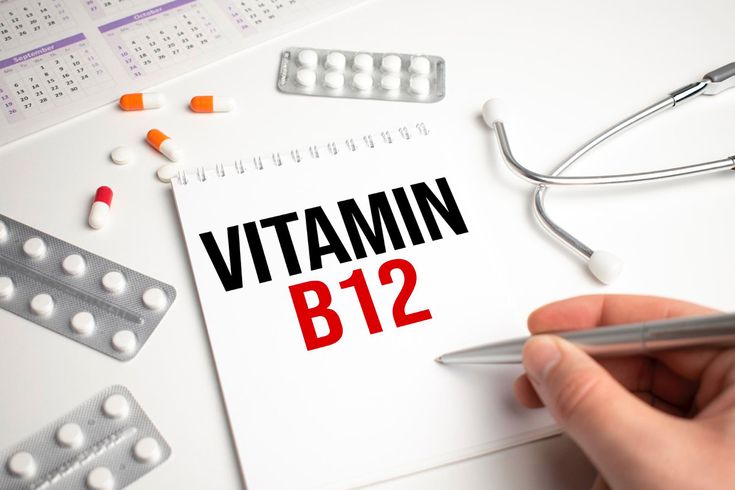Cobalamin, another name for vitamin B12, is a water-soluble vitamin that is necessary for several body processes. It is essential for the synthesis of DNA, neurological function, and red blood cell development.
In contrast to the majority of other vitamins, B12 is largely kept in the liver until the body requires it. It typically takes the body three to five years to deplete its stocks of this vitamin if a person stops taking it.
The vitamin does not seem to be harmful, but people shouldn’t take large dosages of B12 as a panacea. However, taking too much B12 is not advised.
Animal-derived foods include vitamin B12. In the ileum, the final segment of the small intestine that connects to the large intestine, vitamin B12 is often easily absorbed. But the vitamin needs to bind with a stomach-produced protein called intrinsic factor in order to be absorbed. Anemia can arise from a vitamin B12 shortage because mature blood cell production depends on this vitamin. Macrocytes, or unusually big red blood cells, and aberrant white blood cells are the hallmarks of anemia. Because the liver stores a significant amount of vitamin B12, anemia may not appear for three to five years after the deficit starts.
Even in the absence of anemia, vitamin B12 deficiency can result in neuropathy, or damage to the nerves.

Vitamin B12
Symptoms of Vitamin B12 Deficiency :
A vitamin B12 shortage causes anemia that progresses gradually, giving the body some time to adjust. As such, even in cases of severe anemia, symptoms may not be severe.
A few signs of anemia are:
Paleness
Weakness
Tiredness
Severe anemia can result in fast heartbeat, lightheadedness, and dyspnea.
The liver and spleen can occasionally swell.
among younger individuals, stomach and other gastrointestinal malignancies are more common among those with pernicious anemia (caused by a deficiency in intrinsic factor).
The legs are damaged earlier and more frequently than the arms in individuals with nerve injury. The hands and feet tingle, or there is a loss of feeling in the hands, legs, and feet. They can feel weak in the arms and legs.
Some persons experience minor depression, irritability, and confusion. A severe vitamin B12 shortage can cause delirium, paranoia (believing that others are out to get them), and mental impairments, including dementia.
Glossitis and Mouth Ulcers: Inflammation of the tongue and sores in the mouth.

Sources of Vitamin B12 :
Animal products naturally contain vitamin B12. The following are typical food sources:
Meat: chicken, liver, and beef.
Fish: haddock, salmon, tuna, and trout.
Dairy products : include yogurt, cheese, and milk.
Eggs: The yolk in particular.
Foods fortified with B12: To help vegetarians and vegans satisfy their nutritional needs, several plant-based milks, cereals, and nutritional yeast are fortified with B12.
Diagnosis of Vitamin B12 Deficiency :
Blood examinations
Occasionally endoscopy
Large red blood cells found in standard blood tests are typically indicative of a vitamin B12 deficiency. When a patient exhibits common signs of nerve injury, like tingling or lack of sensation, doctors may become suspicious. The blood level of vitamin B12 is checked if the shortage is suspected.
In order to rule out folate deficiency, which can also cause big red blood cells, doctors typically usually analyze the blood level of folate.
When an older person’s vitamin B12 deficiency is verified, no more testing is carried out because the underlying cause—low stomach acidity, for example—is typically not life-threatening. To identify the cause in a younger individual, additional testing, such as blood tests, could be performed.
It is possible to perform an endoscopy, which uses a flexible viewing tube to directly examine internal structures, to see if the stomach cells that create intrinsic factor have been destroyed.
Treatment of Vitamin B12 Deficiency :
Supplemental vitamin B12
If a person has nerve injury, injectable vitamin B12
Supplementing with vitamin B12 is beneficial for older individuals who are deficient in the vitamin, as the deficit is typically caused by trouble absorbing the vitamin from meat. Supplements are a more convenient way for them to absorb the vitamin than meat.
High dosages of vitamin B12 supplements are used to treat pernicious anemia and vitamin B12 insufficiency. People who are deficient in the vitamin but do not exhibit any symptoms can take it orally. To ensure that the vitamin B12 level returns to and stays normal, blood tests are performed on a regular basis.
It is frequently necessary to inject vitamin B12 into a muscle for those with extremely low vitamin B12 levels or symptoms related to nerve damage. For a few weeks, daily or weekly injections are delivered until the vitamin B12 level returns to normal. The injections can be self-administered. Until the condition causing the deficiency can be treated, injections are then administered once a month indefinitely.
Anemia typically goes away in six weeks. However, severe nerve injury symptoms could become irreversible if they persist for months or years. The majority of elderly patients with dementia and vitamin B12 insufficiency experience no improvement in mental function following treatment.





Nice !!!